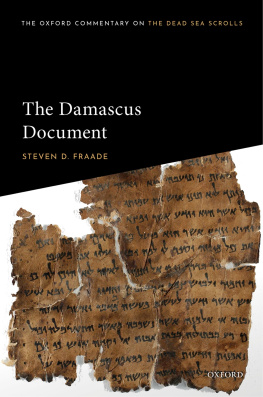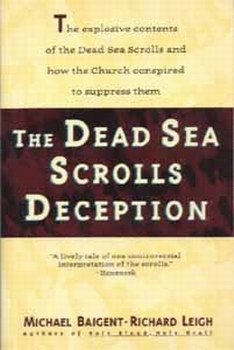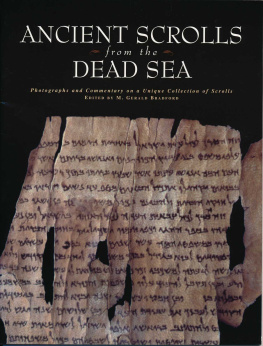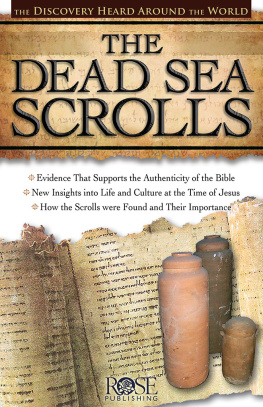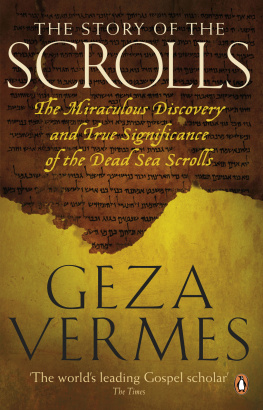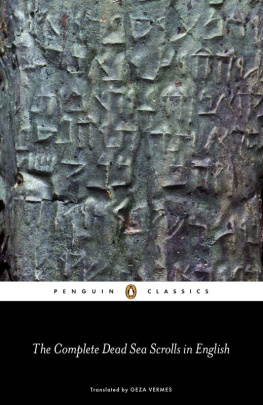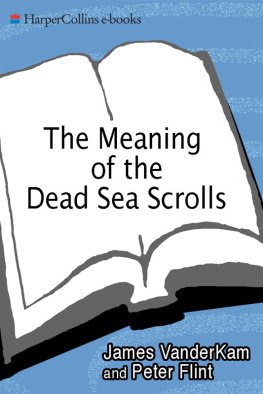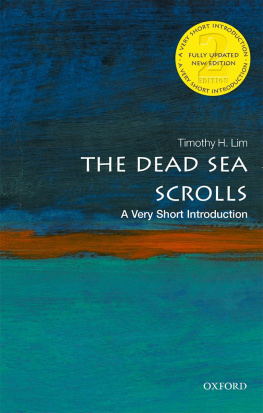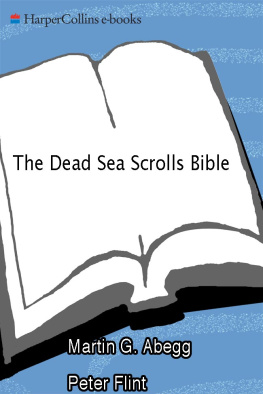The Oxford Commentary on the Dead Sea Scrolls
Series Editor
Timothy H. Lim
The series is intended for the scholarly study of the most important non-biblical Dead Sea Scrolls. It aims to provide scholarship of the highest level that is accessible to non-specialists, based on the best digitized images and readings. Each volume will include a synthetic and substantial introduction, followed by a line-by-line commentary on the scrolls. The commentary will provide an English translation, textual notes, and thematic discussions of the original Hebrew text of the scrolls.

Great Clarendon Street, Oxford, OX2 6DP, United Kingdom
Oxford University Press is a department of the University of Oxford. It furthers the Universitys objective of excellence in research, scholarship, and education by publishing worldwide. Oxford is a registered trade mark of Oxford University Press in the UK and in certain other countries
Steven D. Fraade 2021
The moral rights of the author have been asserted
First Edition published in 2021
Impression: 1
All rights reserved. No part of this publication may be reproduced, stored in a retrieval system, or transmitted, in any form or by any means, without the prior permission in writing of Oxford University Press, or as expressly permitted by law, by licence or under terms agreed with the appropriate reprographics rights organization. Enquiries concerning reproduction outside the scope of the above should be sent to the Rights Department, Oxford University Press, at the address above
You must not circulate this work in any other form and you must impose this same condition on any acquirer
Published in the United States of America by Oxford University Press
198 Madison Avenue, New York, NY 10016, United States of America
British Library Cataloguing in Publication Data
Data available
Library of Congress Control Number: 2021932098
ISBN 9780198734338
ebook ISBN 9780191083525
DOI: 10.1093/oso/9780198734338.001.0001
Printed and bound by
CPI Group (UK) Ltd, Croydon, CR0 4YY
Links to third party websites are provided by Oxford in good faith and for information only. Oxford disclaims any responsibility for the materials contained in any third party website referenced in this work.
In memory of my grandparents
Ida Hutshing Fraade (18751942)
Charles Benjamin Fraade (18721966)
Carola Joseph Spitz (19011999)
Otto Spitz (18871980)

They shall not be absent from your mouth, nor from the mouth of your children, nor from the mouth of your childrens children (Isaiah 59:21).
Preface
This commentary to the Damascus Document was many years in the making, but most recently with acute attention beginning in 2015 with a visiting fellowship at the Israel Institute for Advanced Studies in at the Hebrew University of Jerusalem, at the invitation of Professors Vered Noam and Rami Reiner. The theme for the research group was Interpretation as a Generator of Religious Law: A Comparative Perspective, as good a lens as any (of which there are many) through which to view the Damascus Document. Similarly, I had the privilege to present Reflections on Writing a Dead Sea Commentary on the Damascus Document, to colleagues at the Orion Center for the Study of the Dead Sea Scrolls and Associated Literature at the Hebrew University in 2017, kindly arranged by its director, Professor Esther Chazon.
However, long before that I frequently taught the Damascus Document, either alone or in conjunction with other topics in the history of ancient Judaism, in graduate-level seminars at Yale, with students of very varied backgrounds and interests. On several such occasions I had the great pleasure of co-teaching the seminar with my Yale colleague John Collins. My notes from those seminars would become the skeleton for the present introduction, translation, notes, and commentary. Several prior publications (see bibliography, especially Fraade 1993; 1998; 1999; 2000a; 2000b; 2005; 2006a; 2006b; 2007a; 2007b; 2008b; 2011b; 2018a; 2018b; 2018c; 2018d), most of which began as talks before public audiences, allowed me to test my interpretations and raise unresolved questions before live audiences. All of this is to say that there are more colleagues and students to thank and acknowledge than space or my memory would allow. If you are reading this, you will know who you are.
Over those years, I benefited from leave time and research assistance from my dual homes at Yale, the Department of Religious Studies and the Program in Judaism Studies, and, in particular the generous attention of the Senior Administrative Assistant of the latter, Ms. Renee Reed. I similarly enjoyed the support of the MacMillan Center for International and Area Studies at Yale.
The invitation to contribute this volume to this series, the Oxford Commentary on the Dead Sea Scrolls, came from its series editor, Timothy Lim. He has been steadfast in both his support and criticisms as he copiously and astutely corrected and commented upon several earlier drafts, constantly prodding me to do better, for which I owe him a profound debt of gratitude. Similarly, Connor Boyd of the University of Edinburgh, tirelessly assisted me with proofreading and preparing the indexes, which he did expertly, insightfully, and graciously, and for which I am deeply appreciative.
The editorial staff and affiliates of Oxford University Press made the route from manuscript to book as efficient and calming as could be: Tom Perridge, Karen Raith, Howard Emmens, Cheryl Brant, Katie Bishop, and an anonymous reader.
Finally, but there from the beginning and all along the way, I owe an inestimable debt to my beautiful family. I dedicated previous books to my wife (Ellen Cohen), who was always lovingly supportive and encouraging, to my children (Shoshana, Liora, and Tani Cohen-Fraade, and now Abby Fraade), who took pride, somehow, in my bookish accomplishments, and to my beloved parents (Dorothy and Bert Fraade), of blessed memory, who would have enjoyed great nachas from this book, even though, however much I am deserving, I inherited it from them, by both nature and nurture.
Now it is time to honor my grandparents, of blessed memory, to whom I dedicate this book of ancient words and modern interpretations. I was lucky to have known them all, except for Ida Hutshing Fraade. The one whom I knew the longest, Carola Joseph Spitz, was always genuinely interested in and supportive of my studies. In concluding a book about exile and refuge, I am profoundly aware that they were exiles from Europe (Riga and Berlin) and refugees to New York. As they now take their places as great-great-grandparents, I hope that memory of them and their deeds will continue in each and every generation (4Q270 [4QDe] 2 II, 21).
If, according to Gayatri Chakravorty Spivak (1993: 180), Translation is the most intimate act of reading, then commentary in addition to translation only extends and deepens the experience and the metaphor. Having spent so many years in close and careful attention to the textual practices and verbal meanings of the Damascus Document, we have gotten, as if to say, under each others skin, in a positive sense, sharing each others company rather than mastering it. The publication of this volume can be seen as a modest, preliminary attempt by me to extend such textual intimacy to a broader audience, for which I am grateful to all of the above for having given me the opportunity to do so.

